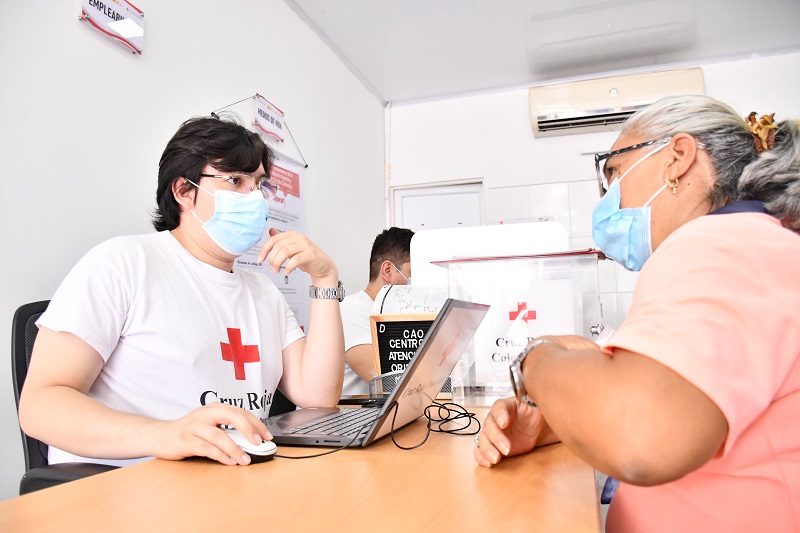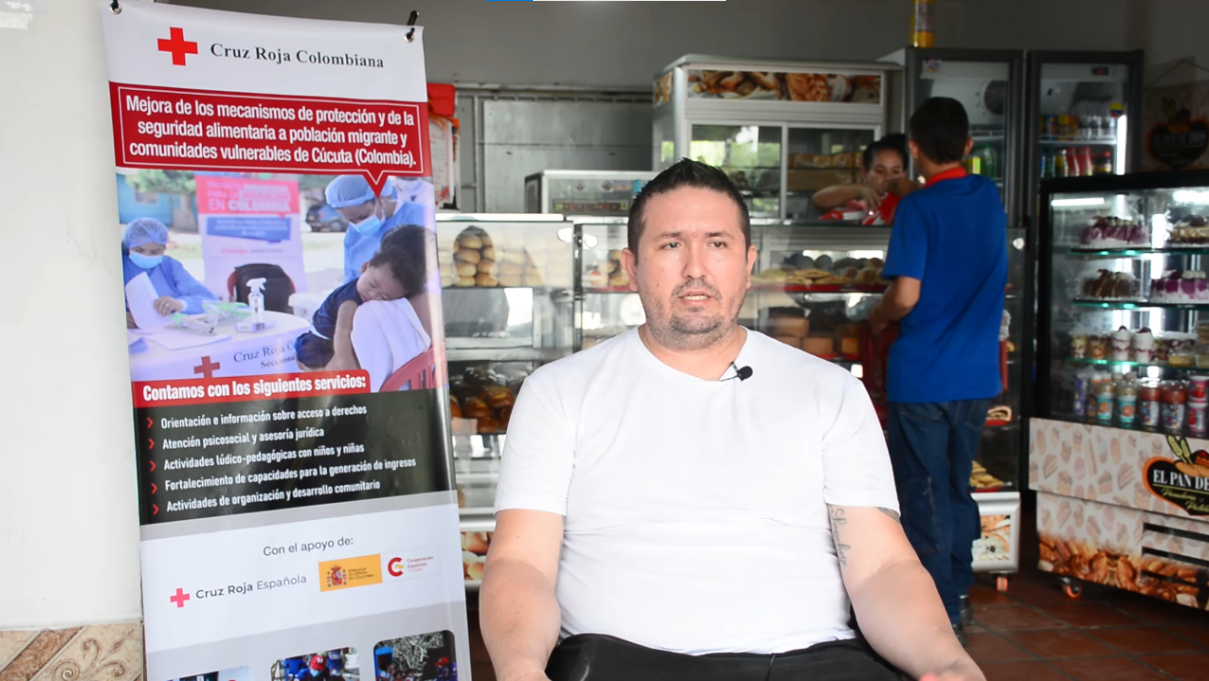Strengthening capacities that provide life opportunities
Colombia is facing one of the most important migration processes in its history as host to the largest Venezuelan migrant population. According to official data, 2.8 million Venezuelans[1] are in the country with the intention of staying. The city of Cúcuta and its metropolitan area in the Department of Norte de Santander hosts around 260,000 Venezuelans, due to its proximity to the border with the neighbouring country. Despite having been in the region for some time and being able to regularise their status since 2021, many Venezuelan people are still not meeting their basic needs and require humanitarian assistance and support to enable their social and economic inclusion in the community. Due to a lack of resources, many have settled in vulnerable settings or in irregular settlements.
Data collected by the Red Cross through its service delivery shows that for 26% of Venezuelan migrants in Colombia, humanitarian aid continues to be the only source of income, while 54% of people with a job do not earn enough to cover their basic needs and cannot access medical care, schooling for their children or decent housing. Worryingly, 6% have witnessed or know of at least one case of violence (mainly against women and girls) or a xenophobic attack.
The COVID-19 pandemic further deteriorated an already precarious situation for many Venezuelan people in Colombia, with lost income opportunities, increased discrimination and encountered endless obstacles to access basic services and protection. To respond to these unmet needs, the Spanish Red Cross and the Colombian Red Cross joined forces to implement a new project in the metropolitan area of Cúcuta. With the financial support of the Spanish Agency for International Development Cooperation (AECID), project partners support both migrants and vulnerable host communities, especially women and children, to address the humanitarian and protection needs of families.

The 2-year project aims to reach 2,000 people, strengthening economic and social inclusion and resilience. The Red Cross provides capacity building and funds to help people find employment or support their livelihoods initiatives. “In collaboration of the Chamber of Commerce and the Progress Bank of the Municipality of Cúcuta, we have provided capacity building on business management. The public and private sectors are working together for the social and economic development of the territory. Efforts aim to strengthen the commitment of the institutions (such as the Municipality and departmental branches of the Ministry of Welfare, Education and Health) with vulnerable communities, including migrants and survivors of the conflict, recognising the fundamental role of these populations for development,” says Natalia Ramirez, Durable Solutions Officer at the Colombian Red Cross.
Throughout the project, the Colombian Red Cross offers support to access protection and information on assistance mechanisms for migrants, but also for survivors of gender-based violence. The project enhances child protection through safe spaces and psychosocial support in the school environment. A Centre for Attention and Orientation has been created in Cúcuta to offer legal and job counselling, as well as psychosocial support.
The Colombian Red Cross also reinforces the capacities of people to promote their financial autonomy, reinforcing inclusion in the community and strengthening economic and social resilience. Activities include capacity building and provision of funds to create and support livelihood initiatives or gain employment. Luís Pabón, one of the participants in the project, explains his migratory experience and what participating in this initiative has meant for him. “I arrived in Cúcuta from Venezuela 6 years ago, with my wife and children. In Venezuela I was a driver, but here I did all kinds of jobs. One day I was given the opportunity to be a baker's apprentice. I liked it so much that I decided to learn pastry making. From there, I opened a small business selling bread and desserts, working from the house where I lived with my family. One day, I contacted the Red Cross and applied to participate in their project which supports micro-enterprises. First, I received training in administration and a contribution to buy ingredients and materials. I was able to expand production and get more customers. I opened a store. In a second phase, the support allowed me to innovate. purchasing suitable refrigeration equipment has enabled me to make and sell ice cream cakes, which were not well known here. The business is working well, and I employ 4 other people, Venezuelan migrants like me. It is important that organisations have this type of initiatives to provide opportunities to continue with dignity.”

The activities are provided in cooperation with local actors, such as the health and care system, education authorities, Chamber of Commerce, the Municipality of Cúcuta and grassroots associations and community action boards.
Since large numbers of people started migrating from Venezuela 7 years ago, it has been necessary to reconvert humanitarian assistance into nexus actions towards development, as most people have no prospect of returning home in the short and medium term. These actions allow inclusion in the host society, without implying an additional burden in already fragile contexts. However, this change of approach is still very slow on the side of both donors and non-governmental actors. Apart from applying this approach in practice, the Red Cross advocates for this switch to promote the resilience and dignity of the people who have had to leave their country.
[1] Source: “Migración Colombia” https://www.migracioncolombia.gov.co/
Basic information
Activity name
Improving protection mechanisms and food security for the migrant population and vulnerable communities in Cúcuta (Colombia)
Country
Colombia
Duration
15/10/2022 – 14/04/2024
Partners
Spanish Red Cross and Colombian Red Cross

